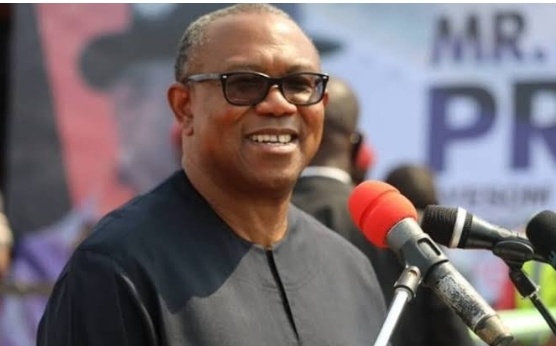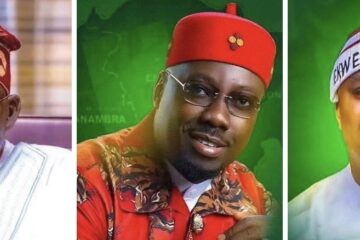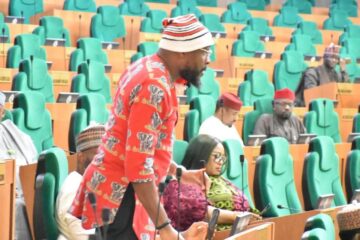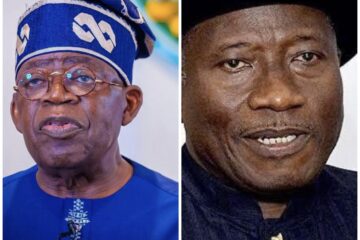It’s no longer news that tested political heavyweights; Atiku Abubakar, Peter Obi, and Asiwaju Bola Tinubu are the respective presidential candidates of Peoples Democratic Party, Labour Party and All Progressives Congress.
But the unprecedented scramble by Nigerians to register and get their Permanent Voters’ Cards (PVCs) is a new development .
While some activists and civil society groups have floated various initiatives to ramp up the PVC registration and collection campaign, others including clerics have deployed some mobilisation drives many perceive as strange.
Last week, the viral video of a Catholic priest who stopped parishioners without their PVCs from entering and observing the mass in his parish, emerged on social media and got tongues wagging.
“If you don’t have your PVC, don’t bother coming.
Because there is no way you have Christians filling up the church but only a handful of them go to vote during elections. So, it means our population and numbers mean nothing. So, we want Christians to take their responsibilities and roles seriously,” the priest could be heard saying in the video.
While nudging one’s disciples to take their civic responsibilities seriously and participate in the electoral process could be a patriotic act, some observers fear that in spite of the advocacies, there is no guarantee that the efforts will translate to anything on election day.
Motivation
Nonetheless, millions of Nigerians who have had a taste of the anguish that visited the country in the past seven years believe that the 2023 election is a divine opportunity to change the fortunes of the nation through the ballot.
Driven by one disaffection or the other, these citizens make up a huge chunk of the potential voters hustling in droves to collect the PVCs in belief that it is their power to hire good leaders to run the affairs of the nation after President Muhammadu Buhari’s tenure next year.
But dethroning the All Progressives Congress (APC) and blocking the return of the Peoples Democratic Party (PDP) to power in 2023 does not look possible to those who are visualising victory at the 2023 presidential poll from the old prism.
Paradigm shift
On the contrary, there is a paradigm shift in the political consciousness of the youth which appears to find expression in the Peter Obi ‘phenomenon’ that is steadily sweeping through the country.
Obi, a former governor of Anambra state, commands a large fan base of young people which is growing exponentially. Some observers believe that if Peter Obi’s campaign is well harnessed, he could pull the Barack Obama effect of 2008 and shock Nigerians with the support of the youth.
When Obama first ran for president, Facebook and Twitter were less than five years in existence, relatively new, and considered “a thing for jobless youth” but his campaign properly harnessed the social media for youth mobilisation.
Many youths in the country, especially those under 30s who took part in the #EndSARS protests that reportedly claimed many lives in 2020, are not slowing down the PVC registration and collection drive.
‘Kingmakers’
These youths are said to be at least 65 per cent of Nigeria’s population, analysts argue that any serious presidential candidate in 2023 must find a way to connect with the youth in order to leverage their large number to victory at the polls.
According to data obtained from the UNDP, an estimated 4.5-5 million Nigerians turn 18 (the constitutional age of electoral franchise) each year, which translates to between 18-20 million potential ‘new voters’ from the 2019 general elections to the 2023 general elections.
This increase in the level of first-time voters also provides an opportunity for young people to determine the next set of leaders for the country through their participation in active citizenship.
The UNDP Nigeria Resident Representative, Mohamed Yahya, told Saturday Vanguard in Abuja: “Young Nigerians and women play a critical role in democracy as they can act as catalysts for social change and good governance simply by participating in the election process.
“Their enthusiasm, resilience, and creativity, however, needs to be harnessed, paired with the right platforms and opportunities for engagement, to help catalyze important changes in Nigeria’s political system.”
Missed opportunity in 2019
Although young people between the ages of 18-35 make up 51.1% of registered voters, it is nonetheless regrettable that more than half of these voters (54%) did not turn out to vote in the 2019 elections.
However, this missed opportunity for young people to shape governance in Nigeria can be reversed with a political mobilization strategy premised on innovation, inclusion, collaboration, consistency, and context-specific interventions.
“Nigerian youths have the numbers to determine elections, and more importantly, they can vote for good governance,” Samson Itodo, Executive Director of Yiaga Africa also told Saturday Vanguard.
He also said that his organisation is one of the civil groups that have floated a project tagged #SixtyPercentOfUs, with a view to mobilising at least 60% of eligible young voters to register, collect their PVCs and actually vote in the 2023 elections.
“Our desire is not just to push for huge numbers of young people to come out and vote, but to also vote for issues and for candidates that will deliver the good governance they yearn for,” Itodo added.
The ongoing Continuous Voter Registration (CVR) exercise ends by 30th June 2022. This will enable the Commission to clean up the registration data, print the Permanent Voters’ Cards (PVCs) and compile the register ahead of the 2023 General Elections.
In the course of the exercise, INEC is also addressing requests for transfer and replacement of lost or mutilated PVCs. Also, previously registered voters who had yet to collect their PVCs have the opportunities to do so.
Facts and figures
Data released by INEC indicate that some 10.2 million additional registrants have been captured in the ongoing CVR exercise. This brought the total number of registrants from 84,004,084 as of May 30, 2021 to about 94,200,000 one year on.
According to INEC, the student population on the Voter Register is about 24.6 million which translates to about 26.57 per cent and is the highest. Concomitantly, youths (18 – 34 years) constitutes 54,480,276 of the register and form the largest voting bloc of about 58 per cent.
The implication of this figure is that the Nigerian youths will decide the fate of new set of leaders to be voted into power come February 25, 2022.
Challenges
Unfortunately, should the Academic Staff Union of Universities (ASUU) fail to call off its ongoing strike before the Election Day and call students back to campus, voter turnout on campuses and around places where students live off campus will be very low.
Moreover, over 20 million uncollected PVCs are stashed in INEC’s vault awaiting pickup by their owners.
Beyond the figures, there has been a serious challenge with the collection of the PVCs as many who registered have yet to turn up for the collection of their cards.
Some reasons advanced for this development include the fact that the PVCs were not immediately printed after the registration coupled with the fact that collection is being done at the INEC Local Government Offices which are not close to where some of the registrants are domiciled.
To ease the pressure, the commission decentralised collection to the Registration Area level while some civil society groups have also introduced logistical interventions.
For instance, WeVote, a not-for-profit organisation, will be providing free bus services to convey people in parts of the FCT, Ogun and Ondo States to INEC offices to register and collect their PVC’s
Mr. Obinna Osisiogu, the convener of WeVote, said that the PVC Bus Drive Project will support at least 60 percent of eligible young voters to register, collect their Permanent Voters Cards (PVCs) and vote in the 2023 elections.
“The project was initiated to eliminate the logistical barriers hindering some Nigerians, particularly those residing in rural areas from participating in the ongoing continuous voters’ registration exercise and collecting their PVCs thereafter.
“Why must the youths collect their PVC? Because that is their only visa to vote. No PVC, no vote. Non-collection shows young people are not serious about changing the nation,” Osisiogu told Saturday Vanguard.
Votes not social media posts matter
But many Nigerians, especially the youths are considered in some quarters as prayer warriors and social media activists who like to indulge in armchair criticisms but not carrying out their civil duties like voting on election days. They are vociferous social commentators good enough for lamentations about the deplorable state of things in the country.
In an interview with Our Correspondent in Abuja, INEC’s Deputy Director, Voter Education, Mrs Mary Nkem, stated that what these social media critics and prayer warriors do not know or choose to ignore is that INEC will not count their verbal exchanges, Facebook tirades, tweets or prayer points.
According to her, INEC will only count the votes. Thus, it is in their enlightened best interest to organise to participate in the electoral process than to continuously agonise.
“If the youths in this country would come out en masse to cast their votes, we will no longer be recording 15 or 20 percent voter turnout in our elections, because we know that the population of the youths alone can make a difference.
“The youths no longer visit social media, they basically live there today. Therefore, when you want to reach out to them, you must go to where you will meet them – social media.
“However, I would like to say that INEC does not conduct an election on social media nor do we count ballots on Twitter or Instagram.
“Our ballots are counted in the ballot box. It is only the ballot paper that enters into the ballot box that the Commission counts.
“So, what does that mean? It means that on election day people must go out to cast their votes. For you to be able to do so, you must be a registered voter and in possession of a PVC,” she said.
Insecurity
Quite unfortunately, while some of stakeholders are still persuading registered voters to go and collect their PVCs, some unscrupulous arsonists LGA offices in the Southeast have decided to burn down structures including INEC offices where unclaimed PVCs are kept.
This ugly development has more or less disenfranchised owners of these yet-to-be-collected PVCs unless there is any official intervention before the election.
In the same vein, the failure of some INEC officials to report in their offices, especially in some South-East states and the reports that some staff of the electoral umpire in Anambra state are charging N1,000 for voter registration, has set some Nigerians thinking that maybe someone wants to disenfranchise the them from participating in the 2023 general election.
INEC needs to urgently address this development, to correct the insinuations in some quarters that there is a plan to disenfranchise voters in some regions of Nigeria by making PVCS unavailable to them.
Extension of CVR exercise
Against this backdrop, the Coalition for Peter Obi, a public action committee for presidential candidate Peter Obi of Labour Party, sensing that INEC may not be able to cope with the demands of the registration before the election commences, is asking INEC to extend the registration period.
“The Electoral body should do everything possible to cater for thousands that are currently stranded trying to register in the various locations or in the alternative, expand its logistics and extend the deadline by six months. “Nigerians must be given the opportunity to freely express their civic rights at this critical time of our nation’s history what it calls a continuous voter registration. The more citizens that can be dragged into the voters’ dragnet, the more democracy shall be served,” Marcel Ngogbehei, the chairman of group, stated.
Vanguard




